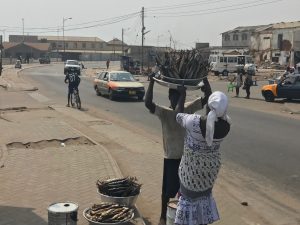Ghana: Accra and Teaching at Meltwater
Exploring around Accra and Teaching
Accra has a great scene of music, bars, and food
Most Meaningful Experience: The entrepreneurs I worked with were driven by creating jobs, solving local problems, and making a better Africa. That left a lasting imprint on me.
The first thing that struck me when crossing into Ghana at its border with Benin was the friendly border patrol women. They smiled, welcomed me and asked what I knew about Ghana. I exclaimed that this was the first time I’d encountered female border patrol officers in Africa, with one replying that Ghana believed in equal rights, employment for women, and ‘we are cool’, she sassed. I knew I was going to like this scene.
She escorted me out of the immigration building and warned me about getting ripped off by money exchangers and not to accept any rate under 5:1. Buoyed by this advice, I confidently haggled until I got a fair rate, then bought a few mangoes and boarded the bus to Accra.
I arrived in the Ghanaian capital in the middle of the night and although ready to be hassled, was relieved by the civility of everything. We pulled up to a roundabout where a line of taxis was patiently waiting (with no hustling or quarreling) and I just walked up to the first one and jumped in. The driver knew exactly where we were going and his taxi meter worked just fine – two signs that we had entered a country whose economy was one step above Togo and Benin.
The difference between the countries was quite startling. Togo and Benin have a per capital GDP of $700-ish while Ghana’s is double that at over $1600 (and growing). The roads and hotels were in better condition, as were the convenience stores, and there were signs of foreign investment, such as restaurants and malls. When I arrived at my dropoff point, the first place I ate at was a western style hamburger and wrap place. As I scarfed down two wraps, I started to think about how Bill Gates divides the world into different economic systems. The world is divided into four economic systems and we should stop using the terms “developing world” and “developed”, as there are many more layers in reality. A light turned on about his classifications.
“One billion people live on level 1. This is what we think of as extreme poverty. If you’re on level 1, you survive on less than $2 a day and get around by walking barefoot. Your food is cooked over an open fire, and you spend most of your day traveling to fetch water. At night, you and your children sleep on a dirt floor.”
The taxi dropped me off at MEST, a business incubator run by meltwater.org that teaches highly talented Africans how to be entrepreneurs. In today’s capitalistic culture, it’s unique to find a company willing to invest its profits for the good of others. Once Meltwater became successful, the founder wanted to give back. So he started a non-profit that is committing $1 million a year over a period of 10 years, training students at schools that have become highly competitive to enter.
I had offered to teach a business development and sales class (really the only thing I knew well enough) as a way to give back and experience Ghana. I spent a week at MEST, which was enough time to create some strong bonds with both the faculty and students. The eclectic team included Todd (a Silicon Valley tech veteran and musician), Ashwin (an Indian entrepreneur), and Dziffa (an energetic French lady who led the fundraising efforts).
Working with entrepreneurs inspired me! They were starting many types of companies including e-commerce, tractor and tools sharing, hiring websites, music companies (spotify-like services), advertising and more. These entrepreneurs are facing obstacles far bigger than any entrepreneur in the US. They lack capital, development is scarce, and not many people actually pay for software. In face of this, these entrepreneurs pushed on to succeed – driven by the aspiration to make Africa a better place.
The campus was a nice facility with four buildings, a kitchen to serve food, and classrooms. The only negative was that we were faced with the constant exposure to malaria, with my travel buddy Tayo, contracting it while we were there. This was because the small campus was separated by a mosquito-infested river connected by a janky bridge that we had to cross to move between the living and dining quarters.
Something I really enjoyed about my time in Accra was sampling the Ghanaian cuisine, especially the stews known as banku and fufu. They featured ingredients we’re often not exposed to in the West, such as okra and plantains. I found a local restaurant that I visited three times to try all of their different stews, as well as Ghana’s version of jollof rice (which everyone presumed I like more than the Nigerian version!) If you want to learn more about Ghanaian cuisine, check out this blog. (https://buzzghana.com/still-single-attract-the-right-man-with-these-10-delicious-ghanaian-dishes/)
In addition to teaching, my time at MEST gave me the opportunity to visit local music bars, watch basketball at the University of Accra and even drive race cars at a newly opened fun park. It was clear that Accra is on the up and up, particularly from an economic and wellbeing perspective.
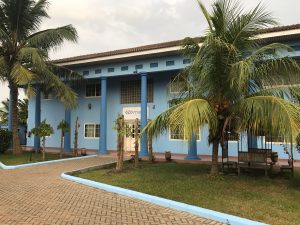
Meltwater Academy in Accra Ghana
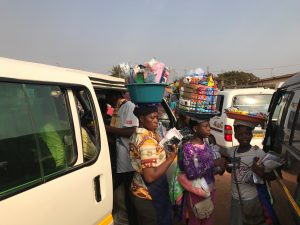
Mini Bus in Accra
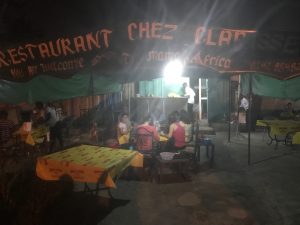
Night Restaurant in Accra Ghana, Chez Gladisse
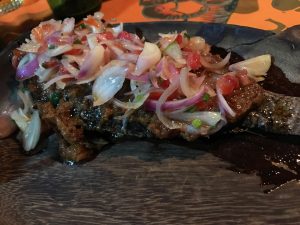
Ghana Fish

Ghana Fufu
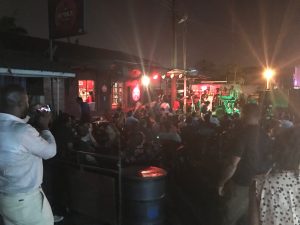
Accra, Ghana Nightlife
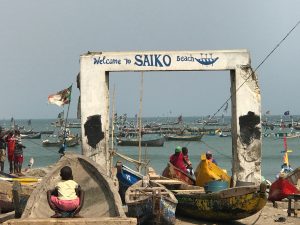
Saiko Beach Slum

Saiko Beach Slum
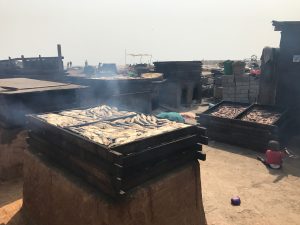
Cooking Fish on the Beach in Accra Ghana
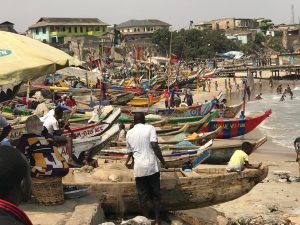
Fisherman Boats in Accra Ghana
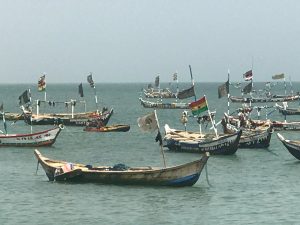
Fisherman Boats in Accra Ghana
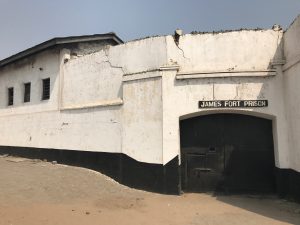
James Fort Prison in Accra Ghana
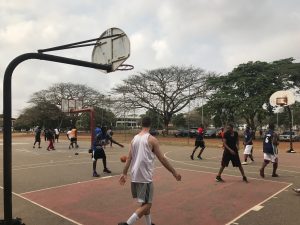
Playing basketball in Accra Ghana at University of Accra, Ghana
